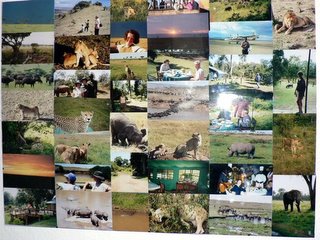Timeline: Mexico.
A chronology of key events:
1910 - Beginning of Epic Revolution, triggered by unrest amongst peasants and urban workers, who are led by Emiliano Zapata.
Emiliano Zapata: Revolutionary was killed in an ambush in 1919
2001: In the footsteps of Zapata1911 - Mexico's dictator, Porfirio Diaz, is overthrown. The new president is Francisco Madero, a liberal. Madero introduces land reform and labour legislation. Political unrest continues with Zapata leading a peasant revolt in the south.
1913 - Madero is assassinated. Victoriano Huerta seizes power.
1914 - Huerta resigns. He is viewed with suspicion by the United States for his alleged pro-German sympathies. Huerta is succeeded by Venustiano Carranza.
1916 - US forces cross the border in pursuit of the guerrilla leader Francisco "Pancho" Villa.
1917 - US forces withdraw, having failed to kill Villa. A new constitution is adopted, which is designed to ensure permanent democracy in Mexico.
1920 - Carranza is murdered. Civil war follows.
The PRI
1929 - The National Revolutionary Party is formed. In 1946 it is re-named the Institutional Revolutionary Party, or PRI.
1934 - President Lazaro Cardenas begins programme of oil nationalisation, land reform and industrial expansion.
1940 - Leon Trotsky murdered in Mexico.
Mexico City's Torre Mayor, Latin America's tallest building
City founded by Aztecs in 14th century
1519: Spaniards led by Hernan Cortes arrive
Population (metro area): approx 20 million
2005: Mexico's sinking city1942 - Mexico declares war on Japan and Germany.
1960s - Unrest amongst peasants and labourers over unequal wealth distribution is suppressed. 1968 - Student demonstration in Tlatelolco, Mexico City, during the Olympic Games is fired upon by Mexican security forces. Hundreds of protestors are killed or wounded. The extent of the violence shocks the country.
1976 - Huge oil reserves discovered in southern state of Chiapas.
1985 - Earthquake in Mexico City kills thousands and makes many more homeless.
1993 - Mexican parliament ratifies the North American Free Trade Agreement (NAFTA) with the US and Canada.
Chiapas rebellion
1994 - A guerrilla rebellion in Chiapas by the Zapatista National Liberation Army is brutally suppressed by government troops. The rebels oppose NAFTA and want greater recognition for Indian rights. The government recognises the Zapatista National Liberation Front (EZLN).
1994 August - Presidential elections won by PRI candidate Ernesto Zedillo Ponce de Leon, after the previous candidate, Luis Donaldo Colosio, was murdered. The stock market plunges in December, the peso loses a third of its value.
1995 - Former President Carlos Salinas goes into exile after his brother Raul Salinas is connected with Colosio's murder.
2003: In pictures - Mexico's ZapatistasProfile: Zapatistas' mysterious leader2001: Zapatistas address congress 1995 November - The government and the EZLN reach an agreement on greater autonomy for the indigenous Mayans of Chiapas.
1996 - The insurgency in the south escalates as the leftist Popular Revolutionary Army (EPR) attacks government troops.
1997 - The PRI suffers heavy losses in elections and loses its overall majority in the lower house of parliament for the first time since 1929.
1997 December - 45 Indians killed by paramilitary gunmen in a Chiapas village. The incident causes an international outcry, President Zedillo starts an investigation.
1998 January - Governor of Chiapas resigns. Peace talks with the rebels are reactivated, but break down at the end of the year.
Fox election victory
2000 July - Vicente Fox of the opposition Alliance for Change wins presidential elections, the first opposition candidate ever to do so. Parliamentary elections see the Alliance for Change emerge as the strongest party, beating the PRI by just over 1%. Vicente Fox: First opposition president, said to have a cowboy image.
2003: BBC Talking Point - Interview with President Fox2003: Fox at signing of UN anti-graft pact 2000 December - Vicente Fox is sworn in as president.
2001 March - Zapatista guerrillas, led by Subcomandante Marcos, stage their 'Zapatour', a march from Chiapas to Mexico City to highlight their demands.
2001 April - Parliament passes a bill increasing the rights of indigenous people. A few days later, Subcomandante Marcos rejects the bill, saying it leaves the Indian population worse off than before. Marcos says the uprising in Chiapas will continue.
2001 November - President Fox appoints a prosecutor to investigate the disappearance of left-wing activists during the 1970s and 1980s.
2002 March - Roberto Madrazo wins the contest to lead the PRI, which governed for 71 years until 2000.
2002 June - Millions of secret security files are released, shedding light on the torture and killing by security forces of hundreds of political activists in the 1960s and 1970s. President Fox says his government is not afraid to pursue prosecutions.
2002 July - Former president Luis Echeverria is questioned about massacres of student protesters in 1968, when he was interior minister, and in 1971 when he was president.
Many would-be migrants are intercepted at the US border.
2004: Mexican migrants' growing influence2005: Mexico's tips to enter US safely2002 September - Three army officers are charged with first-degree murder over the killings of 134 leftists in the 1970s.
2003 September - World trade talks in the Atlantic resort of Cancun collapse after four days of wrangling between rich and poor countries over farm subsidies.
2004 January - Federal-level investigation ordered into unsolved murders of more than 250 women over 10 years in border city of Ciudad Juarez.
2004 July - Investigator deems 1971 shooting of student protesters by government forces to have been genocide; judge refuses to order arrest of former President Luis Echeverria on charges that he ordered attack.
2005 January - Six prison officers are murdered and Mexico's top-security jails are put on high alert amid escalating tension between the authorities and drug gangs.
2005 April - Political furore as Mexico City mayor and presidential favourite Andres Manuel Lopez Obrador is stripped of his immunity from prosecution by Congress in a land expropriation dispute. The government eventually abandons the prosecution.
2005 October - At least six people killed when Hurricane Wilma hits Yucatan peninsula, causing severe floods and damage to buildings.
BBC NEWS REPORT.

 .
.